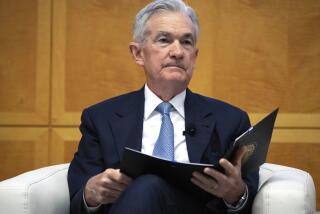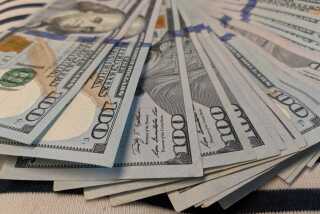Baker Expects Further Fall in Trade Deficit, Says Dollar Is Low Enough
- Share via
WASHINGTON — Treasury Secretary James A. Baker III on Tuesday predicted a further improvement in the stubborn U.S. trade deficit and said the White House has no interest in seeing the dollar fall further.
Baker told the Senate Appropriations Committee that U.S. exporters were now competitive in world markets, thanks to the drop of more than 50% in the dollar’s exchange rate against other major currencies in the past three years.
“With domestic demand abroad likely to remain considerably stronger than in the United States, the real trade balance should continue to improve,” Baker said.
The real trade deficit, which measures goods shipped by volume, not value, has been narrowing since the third quarter of 1986, even though the nominal trade gap hit a record $171 billion in 1987 as the lower dollar bloated import costs.
Baker, who also predicted a drop in the nominal trade deficit this year, said the United States and its major trading partners need to cooperate more closely to ensure that even greater progress is achieved.
But he stressed that a further decline in the value of the dollar, which has rebounded smartly from record lows in early January, was not the solution.
“The United States has and will continue to work closely with its major trading partners to foster exchange rate stability and I want to assure you that the U.S. will do its part in this effort,” Baker said.
A commitment to stabilize the dollar is official U.S. policy, but Baker’s comments were noteworthy because they followed recent suggestions by some top international policy-makers that a further fall might be inevitable.
Swiss Central Bank Governor Pierre Languetin said last month that a further decline in the dollar could not be ruled out.
Some central bank and government officials in Tokyo told Reuters that Japan may have to accept a further dollar fall in the medium term due to the sheer size of world trade imbalances.
Michel Camdessus, managing director of the International Monetary Fund, warned as recently as Monday that on current policies and exchange rates, the imbalances would remain very large over the medium term.
Baker said some of the newly industrialized countries in Asia are finally allowing their exchange rates to reflect economic fundamentals more accurately.
He was responding to a question about the “Four Tigers”--Taiwan, South Korea, Hong Kong and Singapore. Without naming any of them, Baker said: “Progress is being made, at least in a couple of those countries.” Baker praised West Germany and Japan for stimulating their economies, which will suck in U.S. goods, and repeatedly said a further dollar decline could be counterproductive.
He said rising exports would help to offset a slowdown in domestic demand and sustain the U.S. economic expansion, 64 months old and already the longest in peacetime, through 1988.
Although the stock market crash in October had clouded the outlook, Baker said the economy still enjoyed considerable momentum.
“The extraordinary length of this expansion does not necessarily imply an impending downturn as some analysts suggest. Expansions do not die of old age. They have typically been aborted by erratic and inappropriate policy changes,” he said.
If sound policies are followed, including steady money growth and government spending cuts, there is no reason for last fall’s turmoil in the financial markets to lead to a downturn in the economy, he said.
Baker, apparently seeking to end recent public squabbling between Reagan Administration officials and the Federal Reserve over the proper level of interest rates by expressing unqualified support for Fed Chairman Alan S. Greenspan, said the Fed’s monetary policy was in fact on the right track.
More to Read
Inside the business of entertainment
The Wide Shot brings you news, analysis and insights on everything from streaming wars to production — and what it all means for the future.
You may occasionally receive promotional content from the Los Angeles Times.










